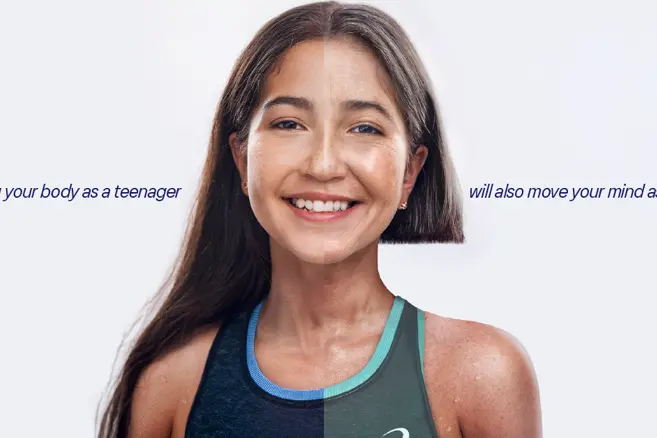PHOTO
- Each additional year a teenager remains engaged in exercise is associated with improved State of Mind scores in adulthood, with the ages of 15-17 identified as the most critical years for staying active.
- In the UAE, 80% of Baby Boomers (aged 59-77) exercised daily in early childhood, compared to 23% of Gen Z. While in Saudi Arabia, 50% of Baby Boomers exercised daily compared to 36% of Gen Z.
- ASICS research reveals it only takes 15 minutes and 9 seconds to start to achieve a mental uplift from exercise.
Today, ASICS is announcing the results of its second Global State of Mind Study, which reaffirms a positive link between physical exercise and mental wellbeing and uncovers a link between being physically active in teenage years and positive mental wellbeing in adulthood.
The study of over 26,000 respondents across 22 countries including the UAE and Saudi Arabia found that the more people exercise, the higher their State of Mind scores. Across the globe, respondents who are regularly active have an average State of Mind score of 67/100, while inactive people have a much lower State of Mind score of just 54/100. However, in Saudi Arabia, this gap is greater, with active people displaying an average State of Mind score of 74/100 while inactive people score 60/100.
What’s more, the study uncovered that being physically active in your teenage years directly impacts your mind later in life. Participants who engaged in exercise throughout their adolescence report higher activity levels and State of Mind scores as adults. The findings indicate that remaining active as a teenager is key to establishing good exercise habits that last into adulthood and positively impact adult mental wellbeing.
In fact, the study was able to pinpoint the ages of 15-17 as the most critical years for staying active and when dropping out of exercise significantly affects your mental state for years to come. Those who regularly exercised at 15-17 years old are found to be more likely to remain active later in life and report higher State of Mind scores as adults (64/100 vs 61/100) than those who weren’t active during these years.
In comparison, respondents who dropped out of exercise before the age of 15 displayed the lowest activity levels and lowest State of Mind scores in adulthood. In the UAE, these inactive adults report being 7% less focused, 6% less alert and 6% less positive compared to those who were able to exercise throughout adolescence.
In fact, every year a teenager remained engaged in regular exercise is associated with improved State of Mind scores in adulthood. Those who stopped exercising before the age of 15 display an average State of Mind score 15% lower than the global average, while a decline in physical activity at 16-17 and before the age of 22 reduced their average scores by 13% and 6% respectively.
The study also uncovered an exercise generation gap, with younger generations being increasingly less active. In the UAE, 80% of the Baby Boomers (aged 59-77) said they were active daily in their childhoods compared to just 23% of Gen Z (aged 18-27), showing a concerning trend of younger generations dropping out of physical activity earlier and in larger numbers than the generations before them.
Professor Brendon Stubbs, a leading researcher in exercise and mental health from King’s College London, said: “It is worrying to see this decline in activity levels from younger respondents at such a critical age, particularly as the study uncovered an association with lower wellbeing in adulthood”.
Gen Zs across the world are already exhibiting the lowest State of Mind scores (62/100) in comparison to the Silent Generation (70/100), so this could be hugely impactful for future mental wellbeing across the world.”
Ana Seixas, Head of Marketing, ASICS Middle East said: “In today’s fast-paced and screen-dominated world, ASICS State of Mind study underscores a crucial truth - how staying active and mental health are interdependent. Movement is not only important for your physical health but is also a lifeline for your future mental wellbeing. At ASICS, we’re committed to empowering young people to move and thrive, because in every stride lies the key to a healthier and happier mind.”
ASICS research shows it only takes 15 minutes and 9 seconds to start to achieve a mental uplift from exercise. Given the link between exercise in adolescence and positive mental wellbeing in adulthood, ASICS is committed to supporting the lifetime athlete in everyone.
To find out more visit: http://www.asics.com/mk/stateofmindstudy2024
About the ASICS 2024 State of Mind Study
The 2024 State of Mind Study was conducted between 17 November – 21 December 2023 and explored the relationship between exercise and State of Mind across the world.
Over 26,000 people were surveyed across 22 markets including Australia, Brazil, Canada, Chile, China, Colombia, France, Germany, India, Italy, Japan, Malaysia, Netherlands, Saudi Arabia, Singapore, South Africa, Spain, Sweden, Thailand, UAE, the UK and the US. Each market sample was nationally representative by age and gender.
MEDIA CONTACTS:
For further information or to organise interviews, please contact moushmi@tishtash.com




















